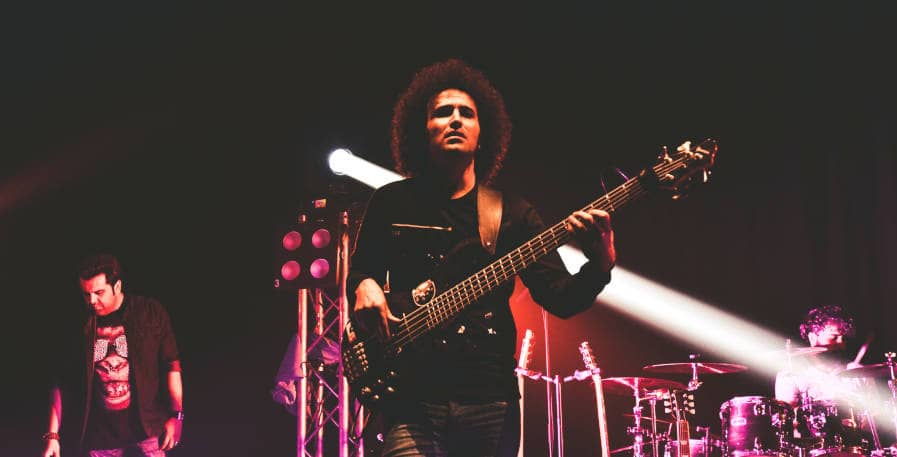Recently, I heard the claim that the bass is a useless instrument. While it`s been a while since I`ve heard this sentiment, it`s one that I`ve run into a couple of times since I picked up the bass.
While some bassists might dislike this statement, I have always found it exciting.
It often comes from people who are big fans of music just like myself. Thus, since this instrument has brought me so much joy I always find it fascinating that both of us can get so much enjoyment out of music, despite perceiving it so differently.
With that, I decided to write down the 7 main reasons I don`t believe the bass guitar to be a useless instrument. This way, I hope to shed some light on why the bass guitar is a staple instrument in most genres of music, and why its role is so important.
7. Bass prevents the music from sounding hollow
Good bands tend to write songs where the instruments fill different parts of the frequency spectrum. As a result, the instruments are easier to distinguish from one another, and the song sounds fuller as a whole.
When the bass is missing, this creates a gap in the low frequencies that bands typically want to fill. This can often result in songs sounding hollow and thin.
While this doesn`t make it impossible for bands to write good songs without a bassist, it does make it harder.
Even bands that don`t have a bass player usually try to fill the low frequencies one way or another. Common solutions to this include using pitch-shifting pedals or to have the keyboards fill in the low-end.
Thus, the bass fills an essential role in making a band sound complete. While other instruments can fill this role to a certain extent, this tends to be a lot more inconvenient. It can also inhibit their ability to fill their intended role within a band.

6. Solos would sound powerless without bass
During guitars and keyboard solos, the solo instrument cannot provide rhythm and harmony the way they normally do.
While that might sound obvious, this also means that this puts their workload onto the other instruments. In particular, this makes it important for the bassist to take up sufficient amounts of space in the mix.
This is especially important in bands that have a vocals-guitar-bass-drums lineup.
This is because, without an additional guitar or a keyboard, the bass has to fill the void of a rhythm guitar. At the same time, it has to hold down the rhythm section with the drummer.
This puts a lot of work on the bass player. However, when they rise to the occasion and are able to do this well, it can make the solo sound amazing as a result.
For some examples of this, here are some examples of the bassline making the guitar solo shine:
| Band: | Song: | Guitar solo timestamp: |
| Red Hot Chili Peppers | Californication | 3:29 |
| Rush | YYZ | 2:22 |
| Tool | Parabola | 0:09 |
| Queen | Bohemian Rhapsody | 4:55 |
| Jimmi Hendrix | All Along The Watchtower | 0:09 |
| Dead Kennedys | Holiday In Cambodia | 2:30 |
| Them Crooked Vultures | New Fang | 0:10 |
5. Most modern music has a bassline
The bass has become an integral part of modern music. Thus, most songs you listen to and like will have a bassline.
This also means that the other instruments in the band have been written with a bassline in mind. As a result of this, their parts would make less sense if we removed the bass.
Verses with just drums, bass, and vocals would become lackluster and empty. Choruses with heavy guitars would sound far less punchy without low bass notes. Chord progressions would lack a clear melodic foundation because the root note is sometimes only played by the bass.
As a result, guitar, drum, vocal, and keyboard parts would sound less potent without the bassline. Covering most modern songs without a bass player thus also often leads to the song sounding incomplete.

4. Bass works as a bridge between rhythm and melody
The bass is a bridge instrument. This means that it “bridges” the gap between the rhythm and melody.
Bands can be divided into two parts: the rhythm section, and the melodic section. The rhythm section consists of drums and percussion, and the melodic section consists of guitars, keyboards, and so on.
Basses, on the other hand, can`t clearly be placed in either, and they do a little bit of both.
The bass works together with the drums to make the song more danceable and groovy. The two instruments work together and rely on each other to make the beat of the song work. Because of this, some even like to think of them as a single instrument when played together.
However, the bass also works together with the guitar.
It provides harmony to the leads and chords that the guitar is playing. The way humans perceive harmony, we could not do anything but listen to the two instruments together. Thus, while the bass and guitar fill different roles in bands they need to work together and play complementing parts.
Without the bass, there would thus be a gap between the drums and the guitar. On their own, they only sound partly connected. The bass thus fills the void that exists between rhythm and harmony by taking part in both.
Most importantly, by bridging the gap the bass not only works together with every instrument of the band. It also makes it possible for all the instruments in the band to work with one another.
3. Bass intros
There are too many amazing bass intros out there to even start counting.
In addition to sounding great, they can also do a lot for a song as a whole. Here are 3 of the main ways bass intros have been used to great effect:
- Create buildup – The other instruments in a band are layered on top of the bass. Thus, a bass intro works great for creating buildup before the other instruments enter the song. For examples of this, listen to “Sittin’ On The Dock Of The Bay” by Otis Redding, or one of the best rock bass of all time, “Jeremy” by Pearl Jam.
- Introduce the main riff – If the main riff of a song is a bass groove, it makes perfect sense to start the song with it. This makes it clear that the bassline is more than just a verse groove, and ensures that it will be heard, even by those who don`t listen for the bass. For examples of this, listen to “Another One Bites The Dust” by Queen, or “Guns Of Brixton” by The Clash.
- Play a solo interlude – While bass solos are great, they can be awkward to place in the middle of songs. This is because they can easily drown among the other instruments, and the low-end has to be filled by someone else. However, they can work well at the beginning of a song to instantly kick it into high gear when there are no other instruments to think about. For examples of this, listen to “Around The World” by Red Hot Chili Peppers, or “N.I.B” by Black Sabbath.

2. You don`t need to “hear” it
Admittedly, I didn`t actively listen for the bass in my early days as a music fan. On some tracks, I thus didn`t even feel like I was noticing the bass.
Intuitively, this can make it seem like the bass would be useless in this case. After all, what`s the point of an instrument that you can`t hear?
However, just because a listener is not noticing the bass, it is still impossible for the bass not to impact their perception of the song.
When we hear a song we feel the rhythm and we feel the harmony, and the bass is part of both. Thus, even if a listener can`t make out how it impacts the song as a whole, it still impacts it.
This is especially common in heavier genres of music. In metal, the bass is often hard to hear because it blends in with the distorted guitars and can thus be hard to distinguish.
However, if we were to remove the bass, a metal song would lose low-end and sound hollower. The wall of distortion would also not sound as heavy, even if we didn`t realize how the bass impacted it.
Thus, even when we can`t clearly pick out what the bass is doing, it`s still filling an important role that shapes how we hear the song.
1. The bass is the most important instrument in a band
A PNAS study from 2014 found that bass-range instruments were the most important in a band.
Ironically, while some struggle to hear the bass, the study found that it is the instrument that makes it the easiest for listeners to understand the music.
One of these reasons for this was how the bass makes us understand chords.
We base our understanding of chords on the lowest note we hear. As the bass plays the lowest note of the chord, we thus gravitate toward it to understand what chord is being played. This holds true even in chords like C/E, where the bass is not playing the root note.
Another reason was that the bass makes it easier to understand the rhythm of the song. It also made people more prone to move to the music by dancing or tapping their feet.
In other words, the bass is what makes people feel and move to a song. Thus, as the bass makes it easier for us to understand and enjoy music, it was concluded that it was the most important instrument in bands.
Conclusion
For the above reasons, I don`t believe that the bass guitar is a useless instrument.
I think it makes a lot of sense why some people find it to be useless though. The impact the instrument has on music is massive, but this impact is not always apparent if you don`t know what to listen for.
Therefore, I hope that the above points shed some light on why the bass is such a common instrument.
It bridges rhythm and melody which makes bands sound more cohesive, and it does so without us even having to pay attention to it.
We get better solos and great bass intros, and it prevents songs from sounding hollow and empty. It has also been deemed the most important instrument in a band in a PNAS study. Therefore, I don`t believe the bass is a useless instrument, even to people who think that it is.

